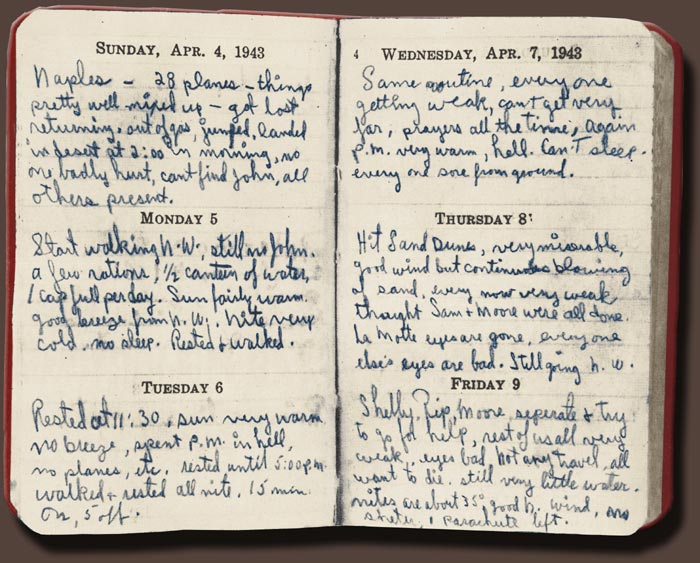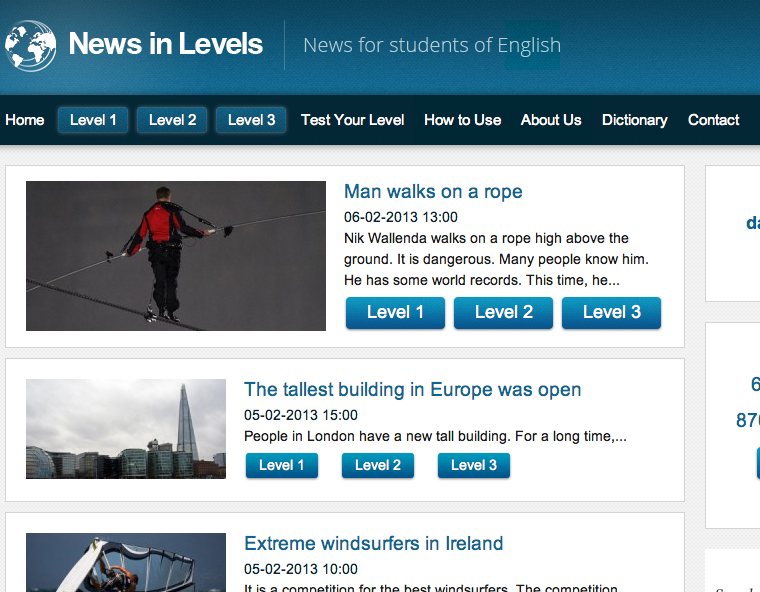Here is a story you can read and listen to:
https://elt.oup.com/student/englishforlife/elem/b_stories?cc=us&selLanguage=en
You can listen to the story and write the missing words.
You can read the complete story and listen at the same time. You can read aloud while you listen. This will help you improve your pronunciation and your reading speed.
You can listen to or read the story and then write the story from memory. How much do you remember? You can use the pictures to help you. Then give your writing to the teacher in the study centre and they will check it for you.
Showing posts with label Listening. Show all posts
Showing posts with label Listening. Show all posts
Wednesday, 17 June 2015
Thursday, 6 November 2014
How can I improve my English outside class? (Part one)
There are lots of things you can do to improve your English outside class. Here are a few ideas:
1. Write a diary. This is good practice for writing and vocabulary. You can ask the teacher in the Study Centre to check it. Write something in your diary every day. You can write about what you did last night (in the past) or what you are going to do the next day (Tomorrow, I am going to...). You can write about something you saw, something in the news, a person you met... Anything! Two or three sentences is enough.
2. Follow a twitter account or subscribe to a website. This account looks useful for elementary students: https://twitter.com/EP_Learning You could subscribe to a BBC podcast to practise your listening skills. For example, http://www.bbc.co.uk/podcasts/series/6min_gram or http://www.bbc.co.uk/podcasts/series/elt_drama It is important that you listen to the podcast several times a week. These podcasts might be useful for Chinese students: http://www.bbc.co.uk/podcasts/series/aab and http://www.bbc.co.uk/podcasts/series/suk
3. Use songs to improve your vocabulary and pronunciation. http://lyricstraining.com/ is a good website where you can listen to the song and write in the missing words, but you can just listen to a song and find the lyrics on the internet.
1. Write a diary. This is good practice for writing and vocabulary. You can ask the teacher in the Study Centre to check it. Write something in your diary every day. You can write about what you did last night (in the past) or what you are going to do the next day (Tomorrow, I am going to...). You can write about something you saw, something in the news, a person you met... Anything! Two or three sentences is enough.
2. Follow a twitter account or subscribe to a website. This account looks useful for elementary students: https://twitter.com/EP_Learning You could subscribe to a BBC podcast to practise your listening skills. For example, http://www.bbc.co.uk/podcasts/series/6min_gram or http://www.bbc.co.uk/podcasts/series/elt_drama It is important that you listen to the podcast several times a week. These podcasts might be useful for Chinese students: http://www.bbc.co.uk/podcasts/series/aab and http://www.bbc.co.uk/podcasts/series/suk
3. Use songs to improve your vocabulary and pronunciation. http://lyricstraining.com/ is a good website where you can listen to the song and write in the missing words, but you can just listen to a song and find the lyrics on the internet.
Thursday, 25 September 2014
Elementary Listening
Here is a link to some exercises where you can practise listening:
http://www.talkenglish.com/Listening/ListenBasic.aspx
You need to click on the number (for example, #01), then click on Step 1. Then click on Step 2 to answer the questions. Finally, click on Step 3 and listen to the conversation again, but now you can read the text too.
Here is another link to some more listening practise: http://www.esl-lab.com/
http://www.talkenglish.com/Listening/ListenBasic.aspx
You need to click on the number (for example, #01), then click on Step 1. Then click on Step 2 to answer the questions. Finally, click on Step 3 and listen to the conversation again, but now you can read the text too.
Here is another link to some more listening practise: http://www.esl-lab.com/
Tuesday, 17 June 2014
Vocabulary: Holidays
There are lots of exercises about holidays here: http://www.esolcourses.com/topics/holidays-and-travel.html You can practise vocabulary, grammar, reading and listening.
Here is a short reading test: http://www.esolcourses.com/uk-english/elementary-course/travel-and-holidays/travel-and-holidays-reading.html
There are many more exercises on their homepage:
1. Elementary http://www.esolcourses.com/content/topicsmenu/elementary.html
2. Lower Intermediate http://www.esolcourses.com/content/topicsmenu/pre-intermediate.html
Here is a short reading test: http://www.esolcourses.com/uk-english/elementary-course/travel-and-holidays/travel-and-holidays-reading.html
There are many more exercises on their homepage:
1. Elementary http://www.esolcourses.com/content/topicsmenu/elementary.html
2. Lower Intermediate http://www.esolcourses.com/content/topicsmenu/pre-intermediate.html
Monday, 16 June 2014
Listening tests: Lower Intermediate and above
There are lots of listening exercises on this website: http://www.esl-lab.com/
The actors have American accents and may use some American vocabulary. Although some listenings are labelled "easy", I think they are suitable for Lower Intermediate and above. They are quite short.
If you like the website, do tell Randall, the website owner.
 |
| http://www.girlytwitter.com/source/Young_puppy_listening_to_music_on_head_phones.jpg |
If you like the website, do tell Randall, the website owner.
Thursday, 3 April 2014
Sunday, 3 November 2013
Listening: Sean Banville and Halloween
Sean Banville is a blogger who has created many websites and lessons. His blog is here: http://seanbanville.com/
And here is the link to his Halloween lesson: http://www.eslholidaylessons.com/10/halloween.html
Near the top of the page, you will see a box called DOWNLOADS. In the box, you can click on MP3 Listening to listen to the recording, and you can also complete many activities online or save them as a PDF or Word document.
And here is the link to his Halloween lesson: http://www.eslholidaylessons.com/10/halloween.html
Near the top of the page, you will see a box called DOWNLOADS. In the box, you can click on MP3 Listening to listen to the recording, and you can also complete many activities online or save them as a PDF or Word document.
Wednesday, 4 September 2013
How To Brew Tea: Listening
The Videojug website has lots of videos that give instructions and tell you how to do things. Here is a link to the food section: http://www.videojug.com/tag/food-recipes
This is the video we watched in class: http://www.videojug.com/film/how-to-brew-tea
This is the video we watched in class: http://www.videojug.com/film/how-to-brew-tea
A News Website: Reading, Listening, Vocabulary
Here is a news website which might help you:
You can read and listen to the same news article at three different levels. Read level 1 first and listen to the recording. If this is too easy, read level 2 and listen to the recording.
Then you need to read more texts at the same level. The texts use the same group of words, so the more you read at the same level, the more words you will be able to remember.
Most of the recordings use an American accent, but you may still find them useful.
If you like the website, tell the owners! I'm sure they will appreciate it.
http://www.newsinlevels.com/
You can read and listen to the same news article at three different levels. Read level 1 first and listen to the recording. If this is too easy, read level 2 and listen to the recording.
Then you need to read more texts at the same level. The texts use the same group of words, so the more you read at the same level, the more words you will be able to remember.
Most of the recordings use an American accent, but you may still find them useful.
If you like the website, tell the owners! I'm sure they will appreciate it.
http://www.newsinlevels.com/
Labels:
Listening,
Lower Intermediate,
News,
Reading,
Vocabulary
Monday, 5 August 2013
Listening: Entertainment
This week, we spoke a lot about different types of film and TV show. What is your favourite genre of film? Why do you like these kinds of films?
There are lots of articles and interviews you can listen to which discuss entertainment. Here is a 6 minute interview with Rowan Atkinson about Mr Bean : http://www.bbc.co.uk/worldservice/learningenglish/radio/specials/163_entertainment_ex/page8.shtml which also contains some useful vocabulary. You can listen to the interview online, or download and save it, and you can follow the conversation using the audio script.
For a full list of similar listenings, click on this link: http://www.bbc.co.uk/worldservice/learningenglish/multimedia/archive_ent.shtml You don't have to listen to them all! Find something that interests you. It may be useful to listen to a couple of film reviews.
Here is a short lesson about films: http://www.bbc.co.uk/worldservice/learningenglish/multimedia/london/unit3/index.shtml
There are a couple of short conversations that you need to listen to. Practise the conversations with a partner.
Then there is a film review to read and some questions. Finally, you can listen to some common phrases used to describe films and practise your pronunciation.
Try the exercises and let me know what you think. Use the new vocabulary by writing a film review. Leave a comment below.
There are lots of articles and interviews you can listen to which discuss entertainment. Here is a 6 minute interview with Rowan Atkinson about Mr Bean : http://www.bbc.co.uk/worldservice/learningenglish/radio/specials/163_entertainment_ex/page8.shtml which also contains some useful vocabulary. You can listen to the interview online, or download and save it, and you can follow the conversation using the audio script.
For a full list of similar listenings, click on this link: http://www.bbc.co.uk/worldservice/learningenglish/multimedia/archive_ent.shtml You don't have to listen to them all! Find something that interests you. It may be useful to listen to a couple of film reviews.
Here is a short lesson about films: http://www.bbc.co.uk/worldservice/learningenglish/multimedia/london/unit3/index.shtml
There are a couple of short conversations that you need to listen to. Practise the conversations with a partner.
Then there is a film review to read and some questions. Finally, you can listen to some common phrases used to describe films and practise your pronunciation.
Try the exercises and let me know what you think. Use the new vocabulary by writing a film review. Leave a comment below.
Labels:
Cinema,
Entertainment,
Listening,
Lower Intermediate,
Purple
Tuesday, 16 July 2013
Listening: Shopping and clothes
Here are two short videos of people discussing shopping and fashionable clothes. They speak very quickly but the words are shown on the video.
Tuesday, 9 July 2013
Vocabulary: Clothes and items of clothing
Think about these questions:
What's the difference between formal clothes and casual clothes?
What kind of clothes would you wear to a job interview?
What sort of clothes would you wear to a wedding?
When you go shopping, how many items do you usually buy?
Do you browse, or do you know what you want before you go shopping?
When would you wear evening dress?
Look at the picture. What's this man wearing: formal clothes, casual clothes or evening dress?
How would you describe the man?
smart scruffy sophisticated trendy fashionable
well-dressed good-dressed messy
(one of these words is rubbish: which one?)
What different patterns do you prefer: Stripes, checks or spots?
Do you like pictures and patterns on your clothes, or do you prefer plain clothes?
Do you like light or dark clothes?
Do you prefer dark or bright colours?
What size are you? Do you prefer loose-fitting clothes or tight-fitting clothes? Skinny jeans are very popular and tight-fitting.
What's the difference between formal clothes and casual clothes?
 |
| Man wearing a dinner jacket |
What sort of clothes would you wear to a wedding?
When you go shopping, how many items do you usually buy?
Do you browse, or do you know what you want before you go shopping?
When would you wear evening dress?
Look at the picture. What's this man wearing: formal clothes, casual clothes or evening dress?
How would you describe the man?
smart scruffy sophisticated trendy fashionable
well-dressed good-dressed messy
(one of these words is rubbish: which one?)
What different patterns do you prefer: Stripes, checks or spots?
Do you like pictures and patterns on your clothes, or do you prefer plain clothes?
Do you like light or dark clothes?
Do you prefer dark or bright colours?
What size are you? Do you prefer loose-fitting clothes or tight-fitting clothes? Skinny jeans are very popular and tight-fitting.
Labels:
Blue,
Listening,
Lower Intermediate,
Lyrics,
Songs,
Vocabulary
Tuesday, 2 July 2013
Holiday songs
 There a couple of songs about holidays on http://www.lyricstraining.com/
There a couple of songs about holidays on http://www.lyricstraining.com/
Choose your Game Mode (Beginner/ Intermediate) and type in the missing words when you hear them in the song.
Use the BACKSPACE <------- key to listen to the words again. Good luck!
http://www.lyricstraining.com/play/13445/boney_m/hooray_hooray_its_a_holiholiday
http://www.lyricstraining.com/play/13445/boney_m/hooray_hooray_its_a_holiholiday
http://www.lyricstraining.com/play/16731/madonna/holiday
http://www.lyricstraining.com/play/5095/green_day/holiday (I think this is really tricky, even at Beginner level!!)
Holiday listening
Do you get confused when you listen to people? This website has many short listening activities:

http://www.listenaminute.com/index.html
Listen to this short talk about holidays:
http://www.listenaminute.com/h/holidays.mp3
Online activities, the mp3 and printable handouts are available for this lesson at http://www.listenaminute.com
Print and complete the gap-fill exercise on page 3:
http://www.listenaminute.com/h/holidays.pdf
This is good practice, because you are listening for more than one word at a time. It's important to practise listening to groups of words, not just single words.

http://www.listenaminute.com/index.html
Listen to this short talk about holidays:
http://www.listenaminute.com/h/holidays.mp3
Online activities, the mp3 and printable handouts are available for this lesson at http://www.listenaminute.com
Print and complete the gap-fill exercise on page 3:
http://www.listenaminute.com/h/holidays.pdf
This is good practice, because you are listening for more than one word at a time. It's important to practise listening to groups of words, not just single words.
Subscribe to:
Posts (Atom)






